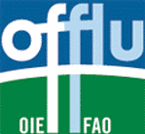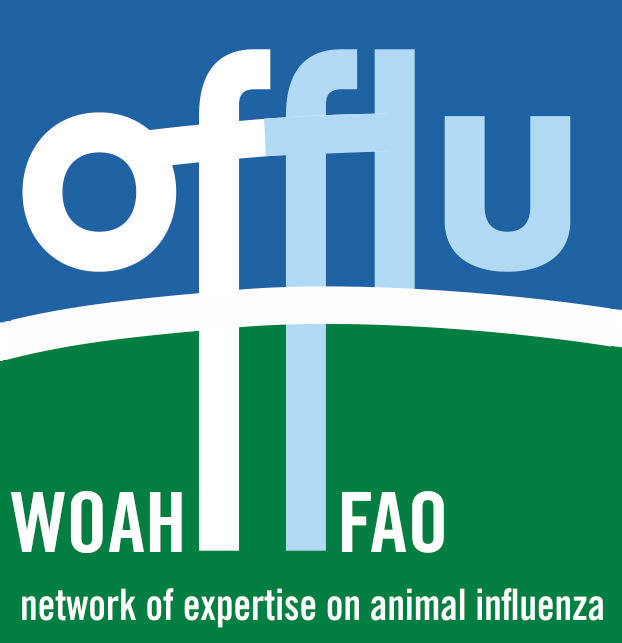
Meetings
OFFLU Committee Meetings
Technical Meetings
Review of AI Control Measures
OFFLU Review of Surveillance Projects
OFFLU Indonesia Project
OFFLU Egypt Project
FAO Projects
LAMP Project Final Report
DELTA FLU Project
OFFLU Strategy meeting for Members of the OFFLU Steering and Executive Committees OIE Headquarters, Paris 25th January 2010
Participants – Steve Edwards (Chairman), Peter Daniels, Hualan Chen, Keith Hamilton, Margarita Riela, Kazuaki Miyagishima, Liz Mumford (observer), Glaieul Mamaghani
By telephone – Gerrit Viljoen, Cristobal Zepeda, Ilaria Capua, Gwenaelle Dauphin, Mia Kim
Apologies – Gideon Bruckner, Kristien Van Reeth
Management meeting
Changes to Executive Committee
Peter Daniels replaces Ilaria Capua as chairperson of the OFFLU Executive Committee. Hualan Chen and Kristien Van Reeth are new members of the OFFLU Executive Committee, and Gwenaelle Dauphin (FAO) and Keith Hamilton (OIE) remain as members.
Outstanding actions
Several actions from the most recent Steering Committee meeting need to be completed.
Actions: FAO to clarify the legal status of OFFLU within FAO (Gwenaelle Dauphin).
OFFLU objectives to be reworded, using outputs from this meeting.
The OIE Biological Standards Commission has been asked to consider the principle of designating OIE Reference Laboratories for swine influenza. FAO confirmed that they are in the process of designating Reference Centres for avian influenza and Newcastle disease and have invited these laboratories to submit additional information about their mammalian influenza activities to consider broadening their recognised expertise to animal influenza.
It was proposed at the September ’09 Steering Committee meeting that an FAO molecular project in SE Asia would be labelled as an OFFLU project.
Action: Peter Daniels to contact FAO Bangkok to follow-up on this.
The latest evaluation of the joint OIE-FAO Global Framework for Progressive Control of Transboundary Animal Disease (GF-TADs) (completed in November 2009) was most positive about OFFLU.
All of the 8 OFFLU Technical Activities remain functional. There have been recent outputs from the biosafety, epidemiology, standard H5 antisera, and vaccine groups.
Action: Executive Committee to choose a new leader of the vaccine Technical Activity, since Peter Daniels will now chair the Executive Committee.
Strategy meeting
Vision
It is important that OFFLU should remain relevant to both animal health and public health. OFFLU has enormous opportunities to contribute to the ‘one health’ initiative, and has become the principle voice of the animal influenza sector for WHO’s Global Influenza Programme. The objectives of OFFLU still stand and remain relevant; sustainability of activities will be a key issue.
Action: Executive Committee to draft a vision statement to express these considerations.
One flu
Feedback from OFFLU experts on the ‘one flu’ concept has been positive, all agreed that there is a need to provide clarity on the scope and practical aspects, and that OFFLU should take the initiative forward. The first step would best be achieved within a focussed OFFLU Technical Activity, that would include WHO participation. Ilaria Capua conceived and promoted the ‘one flu’ concept and should play a key role within OFFLU in taking this forward. Epidemiology is an important component of one flu and Cristobal Zepeda proposed that Dirk Pfeiffer join the ‘one flu’ Technical Activity.
Action: Executive committee to establish a small and focussed OFFLU Technical Activity to address practical aspects of ‘one flu’, feasibility, scope, and resource requirements.
Scope of technical activities
The OFFLU Technical Activities should deliver results. The annual OFFLU technical meeting plays an important role in bringing the experts together to share information and identify priority issues. There will be an opportunity at the OIE Reference and Collaborating Centre Conference in June 2010 for influenza Reference Laboratories to have a short satellite meeting. The next OFFLU annual technical meeting will be deferred until a little later in the year.
OFFLU has an important role to play at the WHO annual seasonal vaccine strain selection meetings. In particular, the OFFLU network can assist in assessing whether current WHO nominated antigens for animal influenza viruses still match the viruses circulating in animals.
Action: Executive Committee to liaise with WHO to formalise OFFLU participation in WHO vaccine strain selection meetings.
Epidemiology activities
The applied epidemiology group has delivered 2 modules of the OFFLU strategy document on surveillance and monitoring for influenzas in animals, and is making an analysis of data collected about global avian influenza surveillance projects.
A summary of the surveillance strategy document is found at Annex 1.
Recommendation: FAO and OIE experts should ensure that, in addition to their technical input, they represent the views and interests of their organisations when participating in OFFLU technical activities and when agreeing on the content of documents.
Action: Applied epidemiology technical activity to complete the remaining modules of the surveillance strategy document.
Terms of reference
The terms of reference for the OFFLU Steering Committee are to deliver the objectives of OFFLU.
The written terms of reference for the Executive Committee and Technical Activities were reviewed and tidied up.
Action: OFFLU Executive Committee to update in line with discussions and circulate these for comment.
Funding
Sustainable funding for OFFLU activities is a critical issue. OFFLU needs to promote the visibility of what has been achieved so far, and the need to maintain these and future achievements.
OIE and FAO communications units support OFFLU and will continue to do so through their media statements and other communications.
Implementation plan
Action: The OFFLU Executive Committee to develop a concise implementation plan to deliver the strategy over the next 12-18 months.
Closing remarks
A key success of OFFLU has been its flexibility, responsiveness, and its functional relationship with WHO. After 2-3 years of success it is the right time to develop a longer term OFFLU strategy, particularly in relation to further developing OFFLU as a tool at the human animal interface.
Future meetings
Steering Committee – July 2010 (date to be agreed)
Executive Committee – 29th January 2010
Technical Meeting -November 2010 (date to be agreed)



